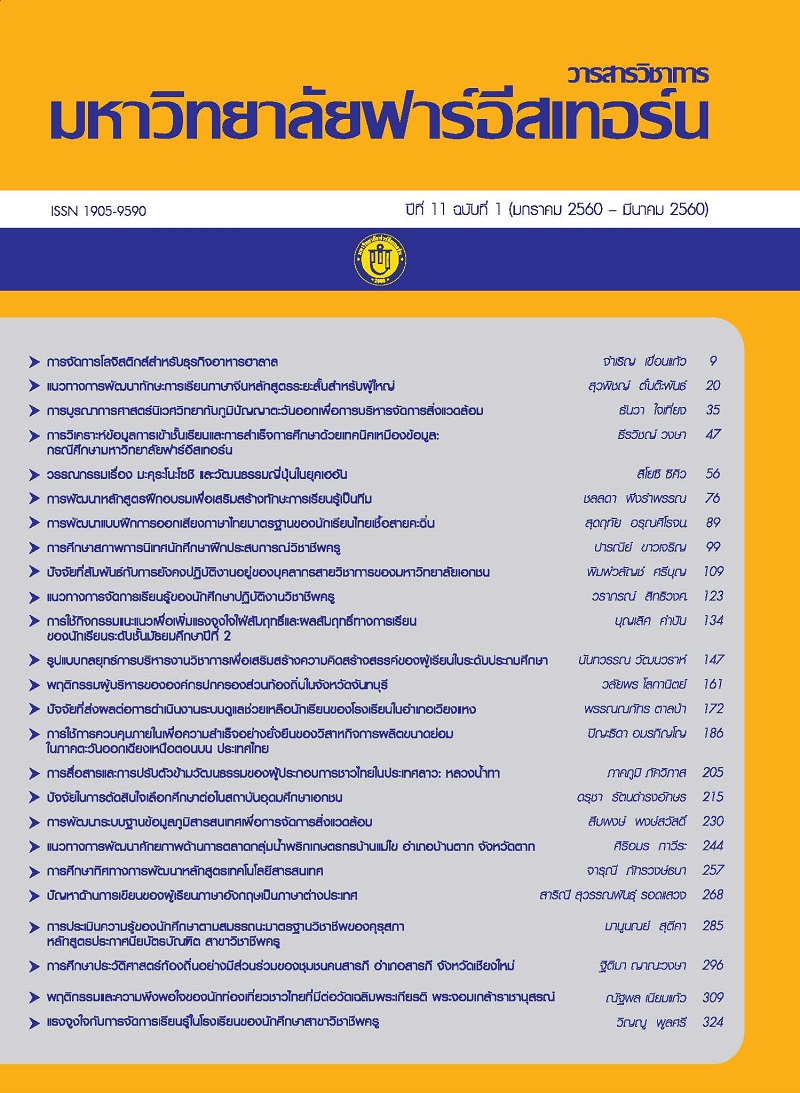การบูรณาการศาสตร์นิเวศวิทยากับภูมิปัญญาตะวันออกเพื่อการบริหารจัดการสิ่งแวดล้อม
Main Article Content
Abstract
Ecology is an important fundamental understanding towards the relationship between various matters in this global and scientists in different field of studies such as ecologists, biologists and science teachers; especially for the environmentalist who should be able to understand and apply knowledge and understanding to manage and resolve such environmental crisis occurring in this day. Although ecology has fulfilled such benefits to the global of sciences since from the past time to the present and even to the future, ecological science has been considered as one of the branch of science that may have some replenishments and flawless or imperfections, particularly when applying it into the context of geographical-culture in Thailand. This article reviewed the formations, key aspects of ecology as a branch of science and its strengths and weaknesses, and also proposed the necessity of the integration of Oriental wisdom.
Article Details
1. Any views and comments in the Journal of Social Innovation and Lifelong Learning are the authors’ views. The editorial staff have not to agree with those views and it is not considered as the editorial’s responsibility.
2. The responsibility of content and draft check of each article belongs to each author. In case, there is any lawsuit about copyright infringement. It is considered as the authors’ sole responsibility.
3. The article copyright belonging to the authors and The Far Eastern University are copyrighted legally. Republication must be received direct permission from the authors and The Far Eastern University in written form.
References
จิรากรณ์ คชเสนี. (2553). นิเวศวิทยาพื้นฐาน. (พิมพ์ครั้งที่ 4). กรุงเทพฯ: สำนักพิมพ์จุฬาลงกรณ์มหาวิทยาลัย.
ธันวา ใจเที่ยง ธรรมวิมล สุขเสริม ปรีชา เปี่ยมพงส์ศานต์. (2555). สังคมอุดมธรรมของชนชาติบรูกับสังคมอุดมการณ์ของพรรคคอมมิวนิสต์ แห่งประเทศไทยในยุคการปฏิวัติประชาชนทศวรรษ 2500-2520.วารสารฟาร์อีสเทอร์น. ปีที่ 6 ฉบับ ที่ 1 (มิถุนายน-พฤศิกายน), 22-30
นิวัติ เรืองพานิช. (2541). นิเวศวิทยาทรัพยากรธรรมชาติ. (พิมพ์ครั้งที่ 1). กรุงเทพฯ: สำนักพิมพ์รั้วเขียว.
ประเวศ วะสี. (2547). ตาบอดคลำช้าง. ใน ประเวศ วะสี (บรรณาธิการ), ธรรมชาติของสรรพสิ่งการเข้าถึงความจริงทั้งหมด (หน้า 7-10). (พิมพ์ครั้งที่ 1). กรุงเทพฯ: สำนักงานกองทุนสนับสนุนการวิจัย.
ประสาน ต่างใจ .(2547). บูรณาการระหว่างศาสนากับวิทยาศาสตร์.ในประเวศ วะสี (บรรณาธิการ),ธรรมชาติของสรรพสิ่งการเข้าถึงความจริงทั้งหมด, (หน้า 285-293). (พิมพ์ครั้งที่ 1).กรุงเทพฯ: สำนักงานกองทุนสนับสนุนการวิจัย.
ประสานต่างใจ. (2548). หลากทัศนะว่าด้วยกระบวนทัศน์ใหม่ การเรียนรู้ในกระบวนทัศน์ใหม่. ในสิริลักษณ์ ยิ้มประสาทพร (บรรณาธิการ), กระบวนทัศน์ใหม่กับการเรียนรู้ของชุมชน (หน้า 70-75). กรุงเทพฯ: โครงการเพื่อเสริมสร้างการเรียนรู้เพื่อสังคมเป็นสุข.
พรชัย พัชรินทร์ตนะกุล. (2547). จักรวาล. ใน ประเวศ วะสี (บรรณาธิการ), ธรรมชาติของสรรพสิ่งการเข้าถึงความจริงทั้งหมด, (หน้า81-95 ). (พิมพ์ครั้งที่ 1).กรุงเทพฯ: สำนักงานกองทุนสนับสนุนการวิจัย.
โครงการพัฒนาองค์ความรู้และศึกษานโยบายการจัดการทรัพยากรชีวภาพในประเทศไทย
(โครงการ BRT). (2543). นิเวศวิทยาการจัดการทรัพยากรและภูมิปัญญาท้องถิ่น. ใน บทความปริทัศน์งานวิจัยด้านความหลากหลายทางชีวภาพในประเทศไทย.มหาวิทยาลัยมหิดล.
สมเกียรติ ตั้งกิจวานิชย์. (2547). ความซับซ้อน. ในประเวศ วะสี (บรรณาธิการ), ธรรมชาติของสรรพสิ่งการเข้าถึงความจริงทั้งหมด, (หน้า 117-142). (พิมพ์ครั้งที่ 1). กรุงเทพฯ: สำนักงานกองทุนสนับสนุนการวิจัย.
อนุชาติ พวงสำลี. (2547). ระบบนิเวศ:สรรพชีวิตสัมพันธ์. ใน(ประเวศ วะสี,บรรณาการ),ธรรมชาติของสรรพสิ่งการเข้าถึงความจริงทั้งหมด, (หน้า 285-293). (พิมพ์ครั้งที่ 1). กรุงเทพฯ: สำนักงานกองทุนสนับสนุนการวิจัย.
โอภาส ปัญญา. (2546). ทำไมการจัดการสิ่งแวดล้อมของโลกสมัยใหม่ต้องใช้ภูมิปัญญาตะวันออก.บทความวิชาการนำเสนองานสัมมนาวิชาการครบรอบ 30 ปี คณะสิ่งแวดล้อมและทรัพยากรศาสตร์ เรื่อง “ร่วมฟื้นฟูสิ่งแวดล้อมด้วยภูมิปัญญาตะวันออก ระหว่างวันที่ 19-20 มิถุนายน 2546 ณ ห้องประชุมสถาบันวิจัยจุฬาภรณ์, กรุงเทพฯ.
Anh, H. V., & Pham, T. V. (2005). Link between spiritual forest and forest conservation: A case study in Noong La village, Son La Province, Vietnam. Asia-Pacific Forum for Environment and Development.
Capra, F. (1997). The Web of Life : A Synthesis of Mind and Matter. (Vol. 2). London: Flamingo.
Chaitieng, T., & Srisatit, T. (2014). The Potential of Indigenous People's Forest: Ecological Benefits and Plants Diversity in Bru People's Spiritual Forest, Northeastern Thailand. British Journal of Applied Science & Technology. 4(17), 2430.
Desjardins, J.R.(2006).Environmental Ethics : An Introduction to Environmental Philosophy. Vol. 1. Canada: Thomson Wadsworth.
Gray, A. (1999). Indigenous People, Their Environments and Territories. In: Programme, U.N.E. (ed.) Cultural and Spiritual Values of Biodiversity, pp. 59-118. London: United Nations Environment Programme
Groenfeldt, D. (2003). The future of indigenous values: cultural relativism in the face of economic development. Futures. 35(9), 917-929.
Marmo, G., Sudarshan, G., and Esposito, G. (2004). From classical to Quantum Mechanics. (Vol. 1). Cambridge: University Press, Cambridge.
Martha J. Groom, Gary K. Meffe C. Ronald Carroll .Principle of Conservation Biology.Sinauer Associates, Inc.Massachusetts USA.
McGregor, D. (2009). Aboriginal/non-Aboriginal relations and sustainable forest management in Canada:The influence of the Royal Commission on Aboriginal Peoples. Journal of Environmental Management. 92(2), 300-310.
Odum, E. P., & Barrett, G. W. (1971). Fundamentals of ecology (Vol. 3). Philadelphia: Saunders.
Parrotta, J.A., and Agnoletti, M. (2007). Traditional forest knowledge: Challenges and opportunities. Forest Ecology and Management. 249(1-2), 1-4.
Parrotta, J.A., Hin Fui, L., Jinlong, L., Ramakrishnan, P.S., and Yeo-Chang, Y. (2009).Traditional forest-related knowledge and sustainable forest management in Asia. Forest Ecology and Management. 257(10), 1987-1988.
Ramakrishnan, P.S. (2007). Traditional forest knowledge and sustainable forestry: A north-east India perspective. Forest Ecology and Management. 249(1-2), 91-99.
Rush, J. (1991). The Last Tree:Reclaiming the Environment in Tropical Asia. New York: The Asia Society.
Seevinck, M.P. (2004). Holism, physical theories and quantum mechanics. Studies In History and Philosophy of Science Part B: Studies In History and Philosophy of Modern Physics. 35(4), 693-712.
Shannon, S. (2002). Integration and Holism. Handbook of Complementary and Alternative Therapies in Mental Health, pp. 21-42. San Diego: Academic Press.
Schroeder, H. W. (1992) . The spiritual aspect of nature: A perspective from depth psychology. In Proceedings of the 1991 Northeastern Recreation Research Symposium, pp. 25-30. G. Vander Stoep.

